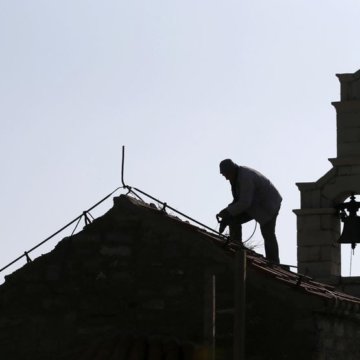- About
- Topics
- Picks
- Audio
- Story
- In-Depth
- Opinion
- News
- Donate
-
Signup for our newsletterOur Editors' Best Picks.Send
Read, Debate: Engage.
| topic: | Democracy |
|---|---|
| located: | Montenegro, Serbia |
| editor: | Katarina Panić |
It’s been a month since Montenegro passed a controversial law on religions despite unrest in parliament and fierce objections from the Serbian Orthodox Church. The large-scale protests against a new rule have been taking place ever since, not only in Montenegro but in the neighbouring countries where the Orthodox Serbs live.
The Serbian Orthodox Church and its supporters claim that the Freedom of Religion Law enables the authorities to steal the Church's property in Montenegro.
The law includes a list of the religious communities' real estates that authorities say Montenegro owned them before it became a part of the Kingdom of Serbs, Croats and Slovenes in 1918, later renamed Yugoslavia.
According to the Serbian Orthodox Church, a provision which says the religious communities will have to provide clear evidence of ownership to keep their properties is the one intentionally designed to allow the government to seize the holdings this church owns for centuries.
In spite of chaotic scenes in parliament, police interventions, people injured in the streets, the tear gas used in capital Podgorica, the detention of protesters and expulsions of government representatives and MPs who backed a law from the church, the authorities refused to withdraw the bill, saying they are the target of hybrid warfare and an orchestrated campaign of misinformation.
"Passing such a law does not serve to honour those who proposed it or those who voted for it. Those who are Orthodox have excommunicated themselves from the Orthodox Church, regretfully. We command the clergy not to do any ecclesiastical work for them until they repent," the church said in a statement.
Now, when the law has entered into force, it is expected the Serbian Orthodox Church introduce its strategy. Most probably, the first step is going to be the Constitutional Court. However, the experts believe the years-long legal battle to prove who is right is about to begin.
What appeared as a side effect is the European Union candidate country intensified pressure on media. This month three journalists were arrested. Gojko Raičević, Dražen Živković and Anđela Đikanović were accused of publishing false reports to cause panic and public disorder. The state censorship in the Balkans is an accompanying phenomenon whenever the people express their anger in the streets.
Image: AP Photo/Darko Vojinovic, File
